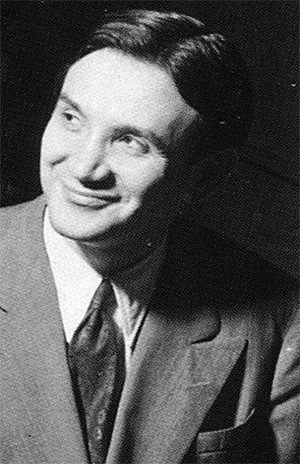Raymond Scott
January 30, 2013

For those of us who studied—really studied—those wonderful Warner Brothers cartoons of the 1930s, ’40s and ’50s, the names that rolled through during the credits are permanently inscribed in our memories: Chuck Jones, Fritz Freleng, Robert McKimson, music by Carl Stalling, voices by Mel Blanc. One name that did not appear was Raymond Scott.
Fast forward many years, steeped in nostalgia at both WVXU and WMKV I’ve come to learn more about Raymond Scott, the far-ahead-of-his-time composer of the 1930s and ’40s, whose quirky, whimsical musical compositions carelessly skirted the fringe of the “Great American Songbook” and was selected and licensed by Warner brothers because Carl Stalling was a fan. Long before his songs had titles in my mind—Powerhouse, Huckleberry Duck, the Toy Trumpet, among others—the melodies themselves were engrained because they were used, often in snippets, in hundreds of those previously mentioned cartoons. It was decided that Raymond Scott was pretty cool and deserved some more research.
Fast forward again to even more recent times and it appears Raymond Scott was even more interesting than was previously hoped. He had a terrifically talented quintet that featured movie composer John William’s dad. He led the CBS Orchestra and Lucky Strike “Hit Parade” bands on radio. He composed everything from jingles to Broadway scores. And, perhaps even more incredibly, he was one of the pioneers of electronic music and sampling so prevalent in music today. He built an early sound effects machine for radio, inspired the famous Moog synthesizer, and built, what has to be one of the most complicated electronic musical instruments ever, the “electronium”—which not only sported hundreds of knobs and flashing lights, but actually used artificial intelligence to compose original music long before the advent of the personal computer. By all accounts, Scott was a relentless work-a-holic who was more comfortable in his personal workshop-studio than in in front of the public limelight.
Raymond Scott is now being “rediscovered” by a new generation of artists who recognized the complexity, and simplicity, of Scott’s unique and innovative “sound.”
It should be mentioned that Raymond Scott’s real name was Harry Warnow and he died in 1994. Last year, in 2012, Harry’s son, Stanley Warnow, produced a wonderful, 98-minute documentary entitled: Deconstructing Dad: The Music, Machines and Mystery of Raymond Scott that gives detailed attention to the various aspects of Raymond’s life. Information can be found at the website: www.scottdoc.com It’s highly recommended! An interview with Stanley was broadcast recently over WMKV and is available in the MH archives.
Read similar stories: In Memoriam, Television , warner brothers
